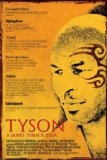| Reviews & Columns |
|
Reviews DVD TV on DVD Blu-ray 4K UHD International DVDs In Theaters Reviews by Studio Video Games Features Collector Series DVDs Easter Egg Database Interviews DVD Talk Radio Feature Articles Columns Anime Talk DVD Savant Horror DVDs The M.O.D. Squad Art House HD Talk Silent DVD
|
DVD Talk Forum |
|
|
| Resources |
|
DVD Price Search Customer Service #'s RCE Info Links |
|
Columns
|
|
|
Tyson
In many ways, the most shocking footage in James Toback's documentary portrait Tyson are the archival interviews of Mike Tyson when he was coming up. "Jesus," I muttered to myself. "He was so young." That's important to keep in mind, when lamenting the spectacular rise and fall of this larger-than-life hero; he was just ridiculously young when the world knelt at his feet. It's no excuse for his mistakes, and he takes full responsibility for them in this painfully candid and honest film. But it is a factor. In the end, he sums up his journey thus far with brevity and precision: "Old too soon, smart too late." So it is.
Director Toback (The Pick-Up Artist, Black & White), who has known Tyson since the young champ was 19, has never been an easy filmmaker to pin down; his filmography is littered with fascinating failures (it also includes Two Girls and A Guy and Harvard Man), films that basically don't work but are overflowing with fascinating asides and admirably stripped-down performances. But in many ways, Tyson has more in common with his 1971 memoir Jim (which he wrote after living with football great Jim Brown) than any of his previous films; then as now, we have the true story of an athlete of tremendous power and unthinkable fame.
Tyson is the only interview subject in the film, a wise choice by Toback. Because we're only talking to him, the entire film has the air of a confession--a man who has decided to set the record straight as best he can, and as honestly as he can. It may rob the film of a conventional documentary-style objectivity (the section, for example, on his rape conviction is tricky), but ultimately, it's not that kind of a doc anyway; it's a character sketch, and as such, it's an increasingly well-drawn one.
The most revealing moments are those in which Tyson confesses his own weakness, from the childhood fears that pushed him to learn to fight (and stayed with him through his initial bouts) to the fears that haunt him to this day ("I'm totally confident, but I'm afraid of everything"). His tribute to "Cus" D'Amato, the legendary trainer who took Tyson under his wing, is unexpectedly moving--"this guy changed my life," he says. "He broke me down and rebuilt me." It's almost uncomfortable to watch this tough, feared man nearly come to tears as he remembers his mentor and friend; recalling D'Amato's death in 1985, Tyson says, "To me, it was like I lost my whole life." He's also admirably plain-spoken about his soap opera marriage to actress Robin Givens. Noting that some have simplified their brief and tumultuous relationship into easy labels (abuser/gold digger, bad guy/bad girl), he shrugs and simply notes, "We were just kids... just kids."
Surprisingly, the film's revelations about his work inside the ring are often just as honest and (frequently) self-deprecating. He reveals that he was suffering from gonorrhea during his 1986 title bout against Trevor Berbick, explains exactly how he took that surprising fall to the canvas against Buster Douglas in 1990, and narrates the vivid section on the first Tyson/Holyfield bout in 1996--his voice-over becomes a kind of internal monologue to match the clips from the fight. Here and in other moments, Toback's use of archival footage is effective and restrained; it is well-used (particularly in a stylized and thrilling montage of his string of late-80s victory), but he doesn't lean on it too heavily.
Toback's direction is occasionally misguided; the chopped-up split screen interview montages are a little too showy (they're thankfully toned down after the opening and used sparingly thereafter), and the periodic interludes in which Tyson's voice-over explains his thoughts on love and desire, which are heard over B-roll of the former champ walking contemplatively on a beach, are full of unfortunate imagery; they're weak and cliché, like a bad TV commercial for an e-dating service. And as admirably frank as Tyson is, he still has some delusional moments--his offhand comment about how a $20-30 million settlement was "some small amount of money" confirms that, as grounded as he may now seem, he's still in this whole other reality.
Still, there are tremendous scenes here. His immediate post-fight interview after his final, sad bout (against Kevin McBride) is so open and upfront, it's like a raw nerve; he says, "I don't got the fighting guts anymore... I'm not an animal anymore," and he clearly means it. Now 42, he says he never thought it'd live to be forty, and proclaims "it's a miracle" that he's still here. In Tyson's powerful closing moments, we are impressed by this portrait of a difficult and talented man, finally at peace. Maybe.
Jason lives in New York. He holds an MA in Cultural Reporting and Criticism from NYU.
|
| Popular Reviews |
| Sponsored Links |
|
|
| Sponsored Links |
|
|
| Release List | Reviews | Shop | Newsletter | Forum | DVD Giveaways | Blu-Ray | Advertise |
|
Copyright 2024 DVDTalk.com All Rights Reserved. Legal Info, Privacy Policy, Terms of Use,
Manage Preferences,
Your Privacy Choices | |||||||











